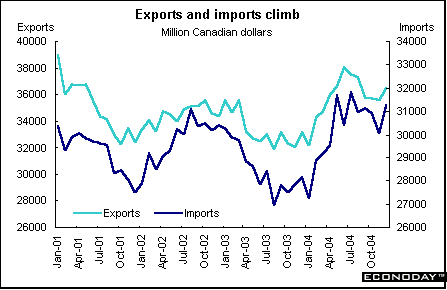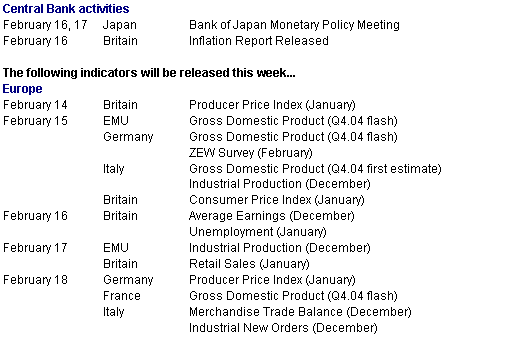Monday, February 14, 2005

Investors had a chance to evaluate the plethora of Central Bank meetings along with the weekend Group of Seven meeting last week as the load of new information eased from the previous week's deluge. Things even quieted down in the foreign exchange market - at least until the U.S. merchandise deficit was unveiled on Thursday. The dollar dropped as a result with traders uncertain as to the dollar's future direction against the euro and yen.
After hesitating for several weeks after the New Year, the equity indexes followed here have reversed direction and (with the exception of the Hang Seng and Nasdaq) have regained earlier losses. Earnings have been good for the most part while merger activity has flourished, adding stimulus for equity investors. With many Asian markets closed for the lunar New Year (the year of the rooster), the French CAC and British FTSE took the spotlight as they crossed the 4000 and 5000 levels respectively for the first time since the spring of 2002. Twelve of 13 indexes followed here were up on the week. Only Nasdaq lost ground on the week.
Global Stock Market Recap

Europe and Britain
The CAC, DAX and FTSE all gained last week. After several tries, the FTSE closed at the 5,000 level on Thursday for the first time since June 2002 and held above that level on Friday. The CAC climbed above the 4000 level on Friday for the first time since June 2002. European stocks benefited from a report saying that Chinese demand for steel would continue to grow. China is the largest consumer of the metal and a major purchaser of European products.
The CAC benefited from a better-than-expected fourth quarter flash gross domestic product estimate on Friday. GDP grew between 0.7 percent and 0.8 percent from the prior quarter thanks to government measures to boost consumer spending. The quarterly growth was the fastest since the third quarter of 2003, when the economy grew 1 percent. The French economy did better than either Germany or Italy because of more robust consumer spending, the largest part of GDP. France's expansion was helped by former Finance Minister Nicolas Sarkozy's measures permitting early withdrawals from employee savings accounts and cutting inheritance and gift taxes. The initiatives encouraged shifts of about �11 billion ($14 billion) out of savings according to government data.

As expected, the Bank of England Monetary Policy Committee kept its policy interest rate at 4.75 percent after raising interest rates five times in the 10 months through August of last year. A rebound in ailing factory output has helped sustain Britain's economic expansion which began in 1992. While growth has picked up, inflation has remained below the central bank's 2 percent target while higher borrowing costs have quashed a five-year housing boom. The Bank of England's 4.75 percent key interest rate compares with 2.5 percent at the Fed and 2 percent at the European Central Bank. As usual, the Bank gave no explanation for its actions today. Rather, Bank of England watchers will have to wait two weeks until the minutes of the meeting are released on February 23rd. But before the minutes are released, the monetary policy committee will publish its latest growth and inflation forecasts in its quarterly Inflation Report on February 16th. Indications are that neither gross domestic product nor consumer price growth has deviated far from November's estimates.
Asia/Pacific
With the lunar New Year being celebrated in a large chunk of Asia, many of the markets were closed for most of last week. However, all six Asian/Pacific indexes followed here were up.
On Monday, prior to closing three days for the lunar New Year celebration, South Korea's Kospi index ended trading at its highest in five years. But on Friday, it edged downward primarily because of revelations by North Korea that it has produced nuclear bombs and is pulling out of talks about abandoning its weapons program. According to South Korean analysts, the drop appeared to be a knee-jerk reaction from mainly overseas investors rather than Korean investors who are used to bad news.

The Nikkei climbed to a seven month high on Thursday thanks to reports of merger activity between brokerages Daiwa Securities Group and Sumitomo Mitsui Financial Group, talk that, in turn, spurred speculation others would follow. The Topix, which managed to edge upward for the four trading days, also benefited after a government report showed machinery orders would be up this quarter. This suggested that capital spending would support growth in Japan. Japanese markets were closed on Friday for National Foundation Day.

The Australian all ordinaries index, after jumping over 22 percent in 2004, has continued its winning ways into 2005. The Australian economy, which has experienced only one negative quarter of growth (Q4.2000 after the summer Olympics) since the 1990-91 recession, continues to grow apace. And while equities here slumped with the rest of the major indexes in late 2002 and in 2003, they turned the corner and haven't looked back since. Worldwide demand for raw materials has boosted the economy and its markets in Asia.

Currencies
After reaching a five year high mid-January, the yen continues to decline as investors fret about the Japanese economy after poor data indicate falling household spending and industrial output. Yen strength also ebbed last week after the weekend Group of Seven meeting. China said it had no immediate plan to change its currency peg to the dollar. The Bank of Japan, which meets this week, thinks there is still a ways to go before the economy can be said to be on a sustainable recovery path. The Bank has kept its benchmark interest rate near zero since 2001 to spur growth and end deflation in goods and services.

The dollar lost ground against the euro after the merchandise trade report showed that the U.S. was still mired in record setting deficits. Investors' focus seems to be shifting between deficit concerns and U.S. growth prospects, which certainly outrank both Europe and Japan. The jury is still out on whether the U.S. will successfully cut its fiscal deficit while consumers voluntarily cut back on their favorite imports. The euro was virtually unchanged against the dollar on the week.
Indicator scoreboard
Germany - December seasonally adjusted manufacturing orders soared 1.2 percent and were up 0.9 percent when compared with last year. However, there could be appreciable downward revisions according to the ministry. All industrial output categories except investment goods improved on the month, led by a 6.1 percent rebound in construction and a 0.9 percent increase in manufacturing. Consumer durable goods were up 5.1 percent while nondurables were up 1.9 percent. Investment goods dropped 2.9 percent after sinking 3.4 percent in November.

December unadjusted merchandise trade surplus was �10.7 billion, down from �12 billion in November. However, on a seasonally adjusted basis, the trade surplus was �12.5 billion, up from November's �11.7 billion surplus. Both seasonally adjusted exports and imports dropped on the month. Exports were down 4.0 percent while imports were down 6.4 percent.

France - December seasonally adjusted industrial production was up 0.7 percent and 2.1 percent when compared with last year. Manufacturing output was up 0.9 percent on the month. Consumer goods output was up 1.4 percent and semi-finished goods climbed by 1.1 percent. However food output sank 1.3 percent.

Fourth quarter flash gross domestic product jumped from 0.7 to 0.8 percent and 2.3 percent when compared with last year. As with all flash estimates, no details are available.

December merchandise trade deficit was �1.892 billion. High oil prices and the strong euro have dampened activity. Exports sank 4 percent while imports edged down 0.2 percent. The export decline was attributed to weakness in large infrastructure projects. In most other categories, exports continued higher, notably for semi-finished goods, autos and drugs.

Britain - December industrial output was up 0.5 percent and 0.3 percent when compared with last year. Manufacturing output was up 0.6 percent and 1.1 percent on the year. Within the manufacturing sector, the sharpest growth of output was recorded for the food, drink and tobacco industries.

December global merchandise trade deficit narrowed to Stg4.428billion from Stg4.711billion in November. The narrowing in the deficit was mainly due a large surplus on the oil account of Stg424 million due to high exports compared with Stg61 million in November. Excluding both oil and erratic items, the trade in goods deficit widened to Stg4.997 billion from Stg4.855 billion. Exports were up 2.4 percent while imports were up 0.6 percent. The total goods and services deficit improved to Stg3.021 billion from Stg3.251 billion. The surplus on the services account was unchanged.

Asia
Japan - January corporate goods price index was down 0.3 percent but up 1.3 percent when compared with last year. Petroleum and coal product prices rose 14.4 percent from a year earlier after climbing 18.4 percent in December.

Australia - January employment increased by 44,500 jobs while the unemployment rate stayed at 5.1 percent - a 28-year low. Full-time employment increased by 24,400 to 7,028,200 while part-time employment increased by 20,100 to 2,840,000. The number of unemployed increased by 5,900 to 533,300. The number of persons looking for full-time work was up by 8,800 while the number of persons looking for part-time work declined by 2,900 to 146,000. The participation rate was up by 0.3 percentage points to 64.1 percent.

Americas
Canada - December merchandise trade surplus was C$5.2 billion. Exports were up 2.6 percent while imports jumped by 4 percent. Automotive products, energy products, and industrial goods & materials each accounted for approximately one-third of the total gain in goods exported. Canada's trade surplus with the United States contracted to C$8.8 billion. Imports from the U.S. rose 7.3 percent while exports to the U.S. were up by 3.6 percent. The trade deficit with countries other than the United States narrowed slightly to C$3.6 billion from November's record deficit of C$3.8 billion. Imports were $9.9 billion and exports $6.3 billion.

Bottom line
While it was a relatively quiet week, some data released qualified as noteworthy. Industrial production perked up for both Britain and Germany. And France's flash GDP report was stronger than expected. A forecast of a pickup in Japanese machine orders sparked investors there. U.S. President George W. Bush's annual budget was met with furrowed brows of politicians from both parties. Economic news picks up next week with gross domestic product estimates from Germany, Italy, France and the EMU. The Bank of Japan will hold a monetary policy meeting - no change in policy is anticipated.
Looking Ahead: February 14 through February 18, 2005




